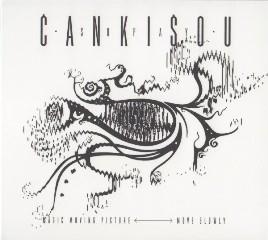Cankisou - Supay (2015)
Cankisou - Supay (2015)

01. KaBouri - 04:02 02. Nomadisavej - 03:11 03. Frida - 04:40 04. Tura gasa Turo to - 03:39 05. Sar di va - 05:00 06. Korobori - 03:45 07. Saribe - 04:17 08. Nasaparé - 04:35 09. Simej - 04:12 10. Lomana Daj - 03:49 Karel Heřman - vocal, harmonica; Roman Mrázek - bass guitar, back vocal; Zdeněk Kluka - drums, timbales, cowbell, finger cymbals, piano, back vocal; Jiří Suchý - drums, timbales, djembe, bells, dunun, percussion, cowbell, back vocal; Martin Marthen Krajíček - guitar, cigar box, tiple; David Synák - soprano saxophone, alto saxophone, baritone saxophone, didgeridoo, sopilka,
piccolo flute, flute, kalimba, banjo, glockenspiel, back vocal; René Senko - tenor saxophone, soprano ukulele, banjolele. + Sváťa Kotas -banjo (06), guitar (06); Luboš Krobot - violin (06); Anna Laborová - vocal (08).
Czech band Čankišou formed at a Christmas party in 1998 and have since then released six albums. Their work’s fuelled by the legend of the ancient one-legged Čanki nation and they sing not in their native Czech but in an artificial language called Canki. The theme of Supay, their most recent album, is the struggle of the Canki to remove evil from our everyday lives and offer protection in the name of the eponymous Supay, Inca god of death.
Karel Heřman is on lead vocals – he may sing in an unintelligible language but he certainly conveys plenty of passion. The other six members sing too but also play instruments including, among others, accordion, timbales, a cigar box and tiple (a small Latin American guitar). As might be expected from such a range of instruments, their music’s highly eclectic, influences coming from all corners of the world: Pakistan, Ukraine and La Reunion to name but three. It’s a mix of rock and what many call world music.
The first track ‘KaBouri’ sets the tone for the album with its full jungly sound. The snare drum’s well to the fore here and the brass augments the driving percussive rhythm, with guitar, flute and didjeridoo adding texture to the main pulse. The “KaBouri! KaBouri!” battle-cry chorus is very infectious, and catchy refrains like this are a feature of the other songs too. Most of the tracks are played at a quick tempo and this is very danceable music – Čankišou’s gigs must be lively affairs.
At times they sound like a mainstream rock band, but at others you don’t know which great combination of instruments is going to hit your ears next. ‘Nomadisavej’ has a very nice sax, bass and percussion solo in the middle and ‘Korobori’, the first slower tempo song, opens with didjeridoo and slide guitar, a very swampy combination. A harmonica solo adds to the bluesy feel but then a banjo and a fiddle, played by guest-artists Svaťa Kotas and Lubomir Krobot, suddenly accelerate the pace, ending the song with a much fuller brassy sound. ‘Nasapare’ has a decidedly Middle Eastern atmosphere and features Anna Laborová on guest vocals, adding a nice feminine contrast to Karel Heřman’s obviously masculine voice.
Whether or not Čankišou take their mythology seriously, that shouldn’t stop you enjoying this great album – which fairly brims with joy. --- ceel.org.uk
Čankišou reprezentują typowe dla Indies Scope folkowo-etniczne brzmienie. Istniejąca od ponad piętnastu lat grupa łączy różnorodne etniczne inspiracje z egzotycznym instrumentarium i rockowymi korzeniami, sięgając swymi poszukiwaniami od Reunionu po Pakistan. Na koncie mają również muzykę do filmu "Nuda v Brně" i choć starają się walczyć z etykietą world music, to na najnowszym albumie "Supay" zdecydowanie podążają ta znaną, ale ciągle zaskakującą drogą. ---dnamuzyki.net
download (mp3 @320 kbs):
yandex mediafire uloz.to cloudmailru gett
